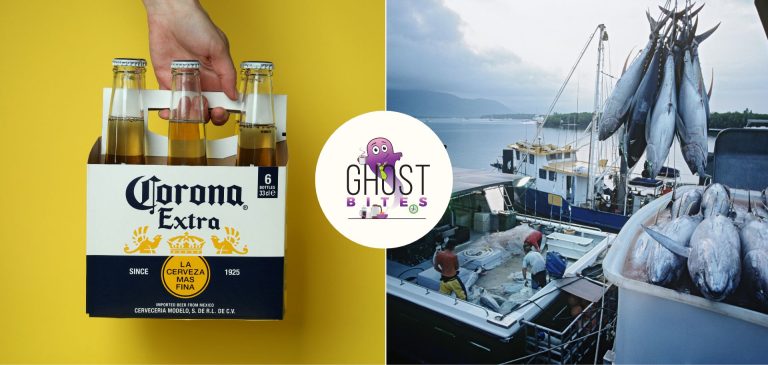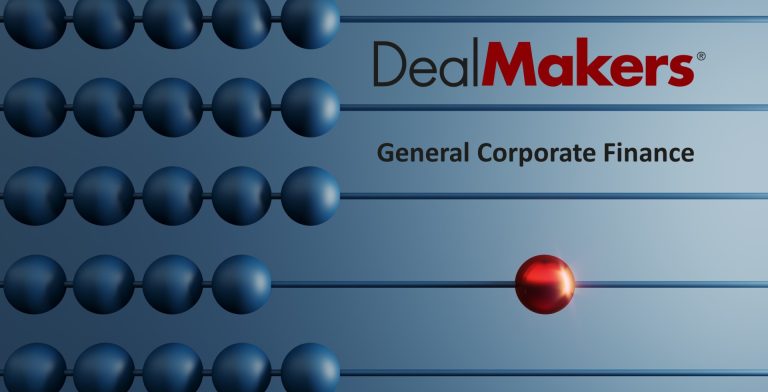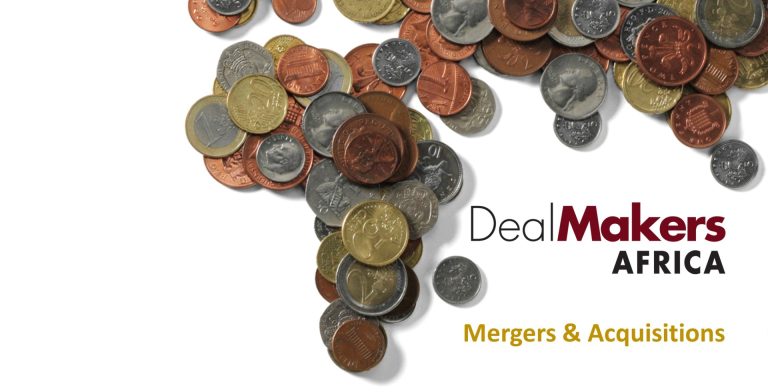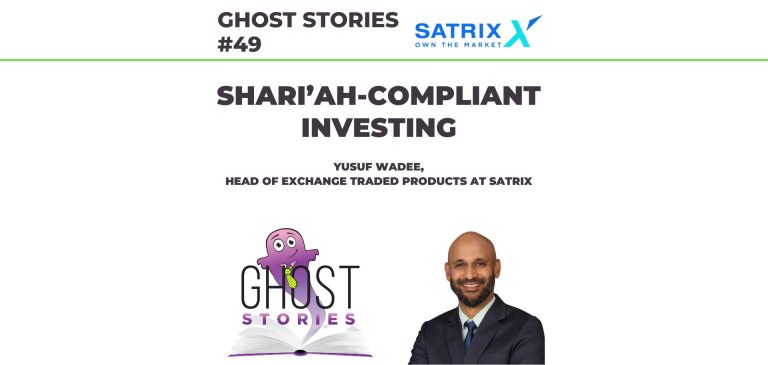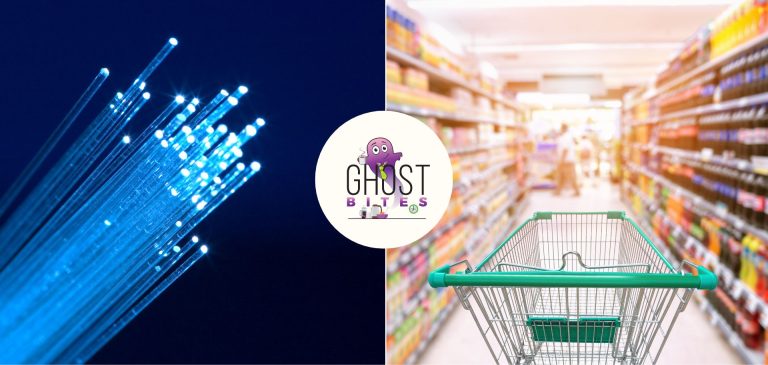Listen to the show using this podcast player:
Shari’ah-compliant investing is a fascinating area in the world of finance. For those of the Islamic faith who choose to invest in this way, these products offered by Satrix are an excellent way to diversify a portfolio – especially with the launch of the Satrix MSCI World Islamic ETF which listed on the market on 22 October 2024.
For those who aren’t familiar with the Shari’ah rules and for those who want to brush up on them, this discussion with Yusuf Wadee of Satrix is a great way to understand the technical process behind identifiying companies in an index that must be excluded to make it compliant with Shari’ah principles. Of course, this leaves a different sector exposure mix and a fund with far less underlying debt, so that’s an interesting topic as well.
This podcast was published on the Satrix website here.
Full transcript:
Introduction: This episode of Ghost Stories is brought to you by Satrix, the leading provider of index tracking solutions in South Africa and a proud partner of Ghost Mail. With no minimums and easy, low-cost access to local and global products via the SatrixNow online investment platform, everyone can own the market. Visit satrix.co.za for more information.
The Finance Ghost: Welcome to another episode of the Ghost Stories podcast. It’s another one with the team from Satrix and I’m very excited today because there’s a new face on my screen recording, there’s a new voice – not to say there’s anything wrong with all the expert voices we’ve had before from the Satrix team, but of course it’s so nice to get different perspectives on the markets and to cover different topics.
And on this specific podcast, we will be jumping into Shari’ah-compliant investing, which is a really interesting topic that I would like to know more about. I know a little bit about it, but nowhere near enough. So, thanks for listening to this show and joining us for this journey.
Yusuf Wadee, thank you so much for making the time to do this. You are the Head of Exchange Traded Products at Satrix. We were talking before we came online about how you were right at the coalface in the global financial crisis in an equity trading role at a different financial services business. You’ve got tons of experience, you’ve seen the markets dish out some good stuff and some bad stuff, no doubt. And I’m really excited to tap into that expertise today. Thank you for doing the show with me.
Yusuf Wadee: Thanks Ghost. Yeah, thanks for having me. It’s quite a pleasure to be here with you and your listeners and I’m looking forward to an interesting conversation.
The Finance Ghost: Yeah, absolutely. I think, just for a moment, let’s dive into some of that background before we jump into the Shari’ah-compliant stuff just because I think it’s interesting. You were an equity trader during the global financial crisis and I think for a lot of people listening to this, they might have either still been studying at that stage or just weren’t in a financial markets role at the time. Speaking for myself, I only finished university in 2010. Like I was saying to you before we got on the show, I’ve literally only ever known post-global financial crisis banking environments, which is just a completely different thing. You know, back then there were prop trading desks in the banks, etc. And then everything changed in the aftermath of the crisis, didn’t it?
Yusuf Wadee: Yeah, certainly was a very interesting time. You know, it felt like, I guess as far as banking goes, it feels like a “before 2008” and a “post-2008” – you know, back then there was a much more free sense of capital, certainly sitting inside a bank. The type of things that banks would probably get up to and be part of was super interesting. You’d see weird and wonderful things that would possibly take place in the bank that doesn’t happen now. I imagine a lot of hedge funds have stepped into the type of activity that banks would have played in that space, whereby they would play in a lot of different markets and fulfil lots of liquidity holding gaps. Being a price-maker has kind of evaporated to a large extent since. And that’s possibly why you see such a big hedge fund business and that market has developed as a result. But it’s not to say that skill isn’t there, it’s just moved, right? I think whatever existed in banks, a lot of that skill and background has moved to hedge funds. So yeah, it certainly was an interesting time back then.
The Finance Ghost: Yeah, I would agree with that. Banks these days are very much flow trading, it’s basically just execution on behalf of clients. They don’t really take much market risk. Back then, prop trading, the bank was using its balance sheet to actually try and generate trading profits, very much like a hedge fund would do now. So yeah, the world is a little bit different.
And of course over that time period, what we’ve also seen is the proliferation of exchange traded funds, ETFs, which is where you are now. Out of interest, what was the driver of moving from that equity structuring environment and trading and all that kind of thing into the ETF environment, which many see as a more vanilla sort of offering? Although I think on these podcasts we’ve tried quite hard to show that ETFs are a lot more interesting than most people realise, there’s actually a lot going on in them.
Yusuf Wadee: Yeah, so I think it was a natural move and it’s exactly to your point. ETFs aren’t just buy side instruments. Well, they are, we’re kind of managing buy-side third party investment portfolios. But in many ways, an ETF embodies a few parts of the capital market system, we’re listing stuff on the stock exchange and that kind of feels like a corporate finance, debt, capital markets type activity because we’re taking, you know, we’re taking structures and we’re listing them on the stock exchange. So it has an element of that that probably never used to sit in a buy side environment prior to ETFs. Right. So the, there’s an element of origination, there’s also an element of being super JC centric. So you’ve got to be close to your stockbrokers, you’ve got to understand the concept of market making, you got to understand the concept of JC trading. And so a lot of these things are directly resonates with an ETF house, possibly not so much with a traditional buy side house that wouldn’t focus as much on, let’s say the capital market aspects. That is quite unique to etf. So it was an exciting move for me, you know, certainly, you know, to put in practice a lot of the stuff that I’ve dealt with for many years prior on the sell side to now, you know, put that in place on the buy side, etc. And it’s been an exciting journey ever since.
The Finance Ghost: Yeah, it’s always interesting for me to see where people have come from and where they’ve gone and why they’ve done it. And I think moving on now to basically what the focus is on this show which is Shari’ah-compliant investing. I’m quite excited to actually come in here and learn about this, although it’s been great to get more of your background. When I saw it on LinkedIn, I thought, no, I have to ask you about what it was like to be an equity trader in the global financial crisis.
Let’s move into the Shari’ah-compliance stuff and I think let’s just start with why these products exist for your Islamic clients. What is it about the Shari’ah rules that make it important that these things exist? This whole Shari’ah-compliance side is very interesting for me. I think let’s just start right at the beginning which is why do these things exist for Islamic clients?
Yusuf Wadee: So if you look at the universe of investments available to, let’s say, Islamic clients or Muslims or followers of the Islamic faith, probably 90% of what’s out there is not suitable for them should they wish to follow and invest in line with the Islamic faith and in line with Shari’ah principles. Whether they’re looking to save for retirement, looking to contribute to their tax free savings accounts, or whether they’re just looking to have a discretionary savings investment portfolio, a lot of what’s out there is not suitable when they want to invest in line with the Shari’ah-compliant lens.
I guess that brings us to the question: what is Shari’ah investing? In a nutshell, it means investing in a way that abides with Islamic law. If you look at the Islamic faith, apart from just being a faith and having certain tenets of faith, Islam also prescribes to Muslims how to live their lives, how to spend their money, how to earn wealth. It’s a full lifestyle, it’s a religion that really describes a complete holistic life for Muslims.
So what actually happens, and this is sort of where Islamic finance kind of originated because you’d have these scholars, these Islamic scholars who would spend many years learning about Islamic law and studying Islamic law, effectively Islamic jurisprudence, they would, based on Islamic law and based on what is permissible and not permissible, apply that lens to many facets of a Muslim’s life. So, let’s take investments as an example.
These Islamic scholars, let’s call them Shari’ah advisory boards, based on the principles and the basic tenets of Islamic law, they would apply that to the investment universe. If I take an example, let’s take the MSCI World Index, it’s a great index. It’s an index that describes the entire world. It’s the large cap stocks from the 23 biggest developed markets in the world. It’s probably the single most overarching index building block, right? Let’s take this index.
There are 1,400 stocks in this index. I’m using this as an example. What would happen for a Shari’ah advisory board is they would take that universe and they would actually screen those 1400 stocks and they would go through those 1400 stocks and go, okay, what is it about these 1,400 stocks that makes them permissible or not permissible? They would look for certain things. The first thing they would try and screen is business activity. For example, they would look at alcohol. Are any of these companies involved in the manufacture of alcoholic beverages? This is not allowed in Islam, so those stocks would not qualify.
Tobacco. Are any companies involved in the manufacturing of tobacco? This is something which is not seen in a positive light from a Shari’ah perspective, so those stocks would be omitted.
Pork. Pork related products. Companies that are involved in the manufacturing or in the distribution of pork related products would be omitted.
Conventional financial services. Companies that are involved in interest, certainly in the payment of interest and earning of interest or trading of interest, they would largely exclude all conventional banks, life insurance companies would be omitted because strictly speaking, interest, that is usury, is not permissible in Islam.
Gambling. Companies that are involved in gaming, gaming companies or hotel groups that have significant gaming portfolios or parts of income derived from the gaming sector would be excluded.
Adult entertainment, obviously that would be excluded.
So that would be the first level of screening that a Shari’ah board would actually do. They would screen business activity. Then of course, there’s something called financial ratio screening. They would look at the companies that satisfy each of those things I’ve just mentioned. Then, they would be further screened. They would look at the income statements and their balance sheets and they would look at what percentage of their balance sheets are exposed to interest. How much gearing do they have? How much interest are they earning or paying? Clearly this has the effect of removing companies with excessive leverage or interest exposure. This goes back to the fact that usury or interest is not permissible.
In a nutshell, this is effectively what Shari’ah investing is. You start with the universe of stocks. You’ve got the basic set of Islamic laws that a Shari’ah scholar or Shari’ah advisory board would apply their mind to. They would screen everything. And what you’re left with at the end is a collection of stocks or portfolio that’s very much in line with Shari’ah investment principles.
The Finance Ghost: It’s incredibly interesting, right? Another example of a framework that gets used, but that I’m always very dubious on, is ESG. In Shari’ah finance, I think there are just these really well-established practices and you can’t really get around them. I think of some of the ESG stuff out there and how a company like British American Tobacco features very prominently in an ESG index. That just tells me logically those rules are not working.
Logically speaking, if someone thinks, okay, I’m buying an ESG product, I’m buying stuff that’s good for society, and then British American Tobacco is in there – it’s all good and well if you go and buy shares in British American Tobacco, that’s fine, it’s a personal choice, but why is it in an ESG index?
What I quite like about the Shari’ah stuff is it feels like you can’t just use some understanding of the rules and then wriggle your way around them. I think a lot of that happens in ESG. People talk about greenwashing and that kind of thing. I’ve never seen anyone talk about “Shari’ah washing” so I’m guessing that’s not a thing. I feel like these rules are applied pretty well.
Yusuf Wadee: You’re spot it. I mean, I guess when it comes to financial metrics and ratios, it’s always at the whim of creative CFOs, right? You could get a CFO somewhere that could dress up their financial statements in a myriad of ways. They could try and game a lot of downstream filters. But in many ways, the Islamic Shari’ah principles are pretty steadfast, there’s not much grey, there’s not much leeway in terms of what is permissible. I guess it’s less likely to have, like you said, the big tobacco type example.
But, yeah, these indices for instance, if I look at the fund that we’ve just launched, we’ve partnered up with MSCI and they do have a Shari’ah advisory committee. This is what they do, they’re constantly looking at the indices, they’re constantly looking at the stocks, they’re constantly screening. There are always new companies coming on board and over time, they may need to tighten up or polish up a filter or revisit a financial statement or look at it more closely. So I guess it’s an ongoing, evolving process, but the idea is always, after all is said and done, land on a portfolio that’s in line with Shari’ah investment principles.
The Finance Ghost: 100%, I think it’s the old – it’s either Munger or Buffett, I think it’s Munger who said: show me the incentive, I’ll show you the outcome. And I think that’s a problem for a lot of the ESG stuff is if you can get your ESG score up, you can go and do all kinds of things like raise finance related to ESG metrics, etc.
The great irony of it is that I’m not really sure there’s a huge incentive for corporates to try and dress up stuff purely from a Shari’ah perspective. You can’t go and, by design, raise finance based on Shari’ah principles. There’s no incentive around that, it’s just different. I think it’s an important lesson for financial markets. We’ve both worked in financial markets, you for longer than me, and you know how it works in terms of incentivisation and outcomes and clever structuring and everything else. I have a lot of respect for that from a Shari’ah perspective that there are just these very well-established principles. It’s in or it’s out and that’s it. There are various tests, starting with what does the company do and then getting all the way down to these financial ratios etc. and I would imagine that the product that gets spat out on the other end is an index that obviously has a lot less financial leverage in it.
So in a period of high interest rates, it probably outperforms an equity index that hasn’t had the Shari’ah lens applied to it. Without the Shari’ah lens, there are a lot of overindebted companies in there, companies that get themselves into serious trouble in a high interest rate cycle or that just end up working really hard so their bankers can have a better life. The Shari’ah funds wouldn’t have any of that. It’s quite interesting.
I would imagine for non-Islamic clients, they can invest in this stuff, right? You don’t have to be of the faith, or do you?
Yusuf Wadee: Yeah, our ETFs are totally available for anyone. ETFs are listed on the stock exchange. It’s available on all our platforms, the Satrix Now platform, on all our downstream LISP platforms. And so anyone for whom this product resonates can buy this ETF.
It’s exactly as you mentioned, at Satrix we started out with market cap indices back in 2000 and we started off with the Satrix 40 and then the RESI and FINI and INDI. These are all sector, market cap-based index portfolios. And if that story resonates with people, then they buy the market cap indices. And then following on from that, we launched the range of factor indices, we had the value, momentum etc. – and again, for investors that resonate with a style-based investment approach, if that’s their flavour, then we’ve got those ETFs. And then of course this spills over into the more recent years where we’ve come up with the country-based indices. We’ve got Satrix China, Satrix India, if you like country stories then you buy that.
Where the Shari’ah product fits is under the broader banner of let’s call it SRI, Social and Responsible investing where you know, there’s kind of a different lens to investments, not just financial ratios. In this cluster you’ve got ESG, Environmental, Social and Governance type investment portfolios, you’ve got Shari’ah. I guess the whole point is that for investors out there, where it’s not just about the financial metrics, it’s just not about the financial ratios, it’s about where your money goes, you actually care about where your capital goes and where your capital gets deployed in the capital markets. If that’s important to you, and again you don’t have to be of a certain faith or you don’t have to be of a certain creed, if you’re just someone who feels that you’d like your capital and your cash to contribute to a sector of the market you think is productive in its nature, then spot on – certainly this fund is not just for Islamic or Muslim investors.
The Finance Ghost: Great. And in terms of those sort of returns, do you have a sense of what they look like versus some of their traditional counterparts without the Shari’ah lens? Obviously it all depends on starting dates and all that kind of thing. But just high level, are the returns comparable? Are they roughly comparable over a period of time or is there actually a noticeable difference?
Yusuf Wadee: Yeah, so you mentioned debt and that’s an interesting thing. There’s clearly not a significant element of debt in the Shari’ah investment funds and that’s because these funds get screened for debt. Any companies that are leveraged to the hilt in debt or significantly trading in interest products would be excluded. The point is debt can be double-edged and we’ve seen this in the property market as an example. Pre-2018 property markets were running super hard. These are all generally, if you look at average rate, these are all highly leveraged companies, significant portions of debt, high LTVs, some higher than others. I’m just using property as an example. What you find is that when the going is good, the debt works for you, as long as you’ve got rental escalations and you’ve got high occupancies, it’s a great story. But if you look at post-2018 where some of these companies started with a bit of a wobble and that wobble kind of sped up going into Covid, all of a sudden you got an environment with low occupancy rate. There’s an environment of being unable to push through rental escalations. Then you start having high debt servicing costs and debt becomes a problem. And then all of a sudden that you realise that debt is a double-edged sword.
Shari’ah funds probably wouldn’t benefit, I don’t know if that’s the right word, but wouldn’t be exposed to companies that are significantly leveraged. But whether that’s a good thing or bad thing, I guess time will tell.
If I just look at some of the numbers, If I take 2023, the calendar year as an example, if I look at the new fund we’re about to launch, which is the MSCI World Islamic ETF, this fund would have yielded 32% in that year versus let’s say the MSCI World which would have returned 33%, it’s very close and it’s coincidentally close. These are very different funds, they’re very different indices. For instance, MSCI World has 1,800 stocks, the Shari’ah ETF only has 300 -odd stocks. These are very different ETFs.
We can chat about the sector exposures just now, but the performance has been remarkably similar. And again, it probably talks to what we’ve seen in the market in the last couple of years. The rising tide kind of rises all boats. There’s a little bit of that if I take a slightly longer-term horizon. If I take five years, so the last five years annualised return per year would have been 14% for the Sharia ETF, 14% every year which is not too shabby versus the MSCI World of 16%. Sure, it’s lagging a little bit behind the MSCI World, but not by a lot. And you know, this maybe talks to your point, the exposure to companies with a little bit of debt could play a part, but also maybe not. You know, they are very different sectors. But it is very comparable to other global indices that we’ve launched and I think investors would find that quite exciting, as South African investors looking to obviously diversify away from South Africa.
The Finance Ghost: It’s really going to depend on the time period, right? If it’s a time in the world where technology companies are driving this in a big way, I imagine the tech companies would pass the Shari’ah tests. They generally are not over-indebted, they’re not selling impermissible products. If that’s a big part of the index, it’s going to be in both. And I think that’s part of what you’re seeing there in how close that performance is.
In South Africa it might be a bit different. You would have been quite happy to avoid the local banks. actually for many years in South Africa they really were not necessarily great performers at all. You would have been very happy to avoid companies with too much debt because that’s the other thing in the South African market, companies are borrowing at structurally high interest rates relative to the equity returns that they can generate. It’s not the case in the developed world. You know, a lot of high growth companies can get their hands on debt finance quite cheaply. So it’s just interesting and I think it’s important if you are able to weigh one against the other. Again, the whole point of this is that if you need to invest in Shari’ah-compliant funds, you’re not sitting there going, oh well, I could alternatively have the other index. You’re looking at this and saying, within the Shari’ah-compliant basket, what’s available to me and what am I looking for?
I don’t need to invest in Shari’ah-compliant funds, but it’s just interesting for me to understand the differences between them. It’s fascinating to see how finance really works in practice. I really do love it, obviously, otherwise I wouldn’t do what I do.
I think let’s maybe claw it back from my little intellectual curiosity down to something a bit more practical, which is for investors who are looking for Shari’ah-compliant funds, what does the basket look like from a Satrix perspective? What’s on offer? You’ve already mentioned the World Islamic Feeder ETF, which is the new one, but I think there’s other stuff in there as well, right?
Yusuf Wadee: Let’s spec this ETF. It’s a super interesting ETF. The way we structure it is as a feeder. We will not be replicating the index ourselves. We do feed into an iShares BlackRock ETF and there are lots of benefits of that. We achieve scale pretty quickly. We get the benefit of a larger investment team right off the bat. That’s a model that works for us. A lot of our ETFs are structured as feeders, so that works well.
The other thing I want to mention is that we do purify the dividends. What happens is these funds generate cash, so they do pay a distribution. What our index partner MSCI does, they maintain a tally of stocks, or let’s call it unpurified dividends or components of the distribution whereby let’s say it happened to be derived from an illicit source. What MSCI will do is they’ll publish that and they’ll maintain a tally of what that is and Satrix will dispose of that in a Shari’ah-compliant fashion. Investors receive purified dividends out from our fund and our side. That’s a hallmark of all Shari’ah-compliant funds in South Africa. Our funds will be structured the same way and is no different in terms of sectors. This is where I think it becomes quite interesting.
You talked about the sectors. We’re launching the MSCI World Shari’ah ETF, chosen from the MSCI World from large- and mid-cap stocks globally. It’s a super big universe and from the 23 biggest developed markets in the world. You’re literally choosing from the cream of a crop, really super high quality blue chip companies that exist globally.
Yusuf Wadee: So after screening, what we’re left with is the sector exposure and I think this is quite interesting. The sector exposure for the Islamic ETF is we’ve got tech at about 38% which is quite interesting vs. the MSCI World MSCI world of 32%. It’s got a little bit more tech. And I guess this talks to your point that tech does sort of qualify a little bit easier…
The Finance Ghost: Kind of as expected.
Yusuf Wadee: Right, exactly, exactly. What is interesting though is that there’s a bit more broad-based tech. 18% of the tech is in broad-based tech that sits outside of the Magnificent Seven. And that’s not the case in the MSCI world, you’ve only got 13% that sits outside of the Magnificent Seven. So there is a tech play, there’s an upweighting effect of tech, but you’re getting stuff that’s longer in the tail of tech, which I think is interesting. Tech’s run hard and this could be an interesting play for investors in this portfolio. You’ve got a bigger tech play, but the upweight has come from stuff that’s further down than the Magnificent Seven.
There’s no financials versus the MSCI world, which has got 15% financial. So there’s 15% that needs to find a home. You can kind of see where it goes in the Shiri’ah fund. It goes into healthcare, which gets bumped up from 11% in the MSCI World up to 13%, a 2% bump in healthcare.
Energy gets a big bump. Energy goes up to 13%, where energy is only 4% in the MSCI World. I do think you’re left with quite an interesting portfolio. I wouldn’t want to say it’s more value based, but clearly you’ve got whatever was in the Magnificent Seven spread down into the tail of the tech, which I think is interesting. And healthcare and energy gets, gets a bump, which I think makes for an interesting fund.
If I look at some of the stocks, they are the who’s who of global blue chips. You know, you’ve got companies like Microsoft, Tesla, Exxon, Procter & Gamble, Johnson & Johnson in there. Certainly all the big pharma is there represented in this fund. You’ve got the car manufacturers, the likes of Suzuki, Toyota. You’ve got beauty companies like L’Oreal.
Intel, Rio Tinto, tyre companies like Bridgestone, Continental. This is certainly a very blue chip fund that is looking quite exciting for Islamic investors.
The Finance Ghost: So Yusuf, listening to you talk about what happens with distributions and the different weightings is really interesting. Does that mean that the dividend yield is probably lower on a Shari’ah-compliant fund, or do some of those sector exposure differences then make up for it? Because it sounds like there are some bigger dividend payers sitting there like energy potentially, healthcare, the value-based sectors that you’ve mentioned.
Yusuf Wadee: Yeah, we wouldn’t expect dividends to be too different from some of the global headline indices like the MSCI World. It will be very comparable. If you’ve got MSCI World at 1.5%, 1% odd or just slightly more than that, we would expect this ETF to be very similar.
That’s because whatever you are foregoing in the financial stocks, you’re probably topping up in pharma or you’re topping up in energy and these are also big divi payers. I think it would be very comparable from a distribution perspective. And again, it’s because it’s kind of what we see for most global stocks.
South Africa is a big divi player and that’s just because of where our P/Es are and our multiples are, so South African stocks have traditionally been big distribution payers globally though. And yeah, these markets have run hard, so whilst there’s still lots of growth potential, you generally find the scale of the distribution, the dividends that you’d earn from these global indices aren’t directly comparable to what you would earn locally. But having said that, again, we wouldn’t expect there to be a penalty or anything like that on this ETF.
The Finance Ghost: Absolutely. The components of returns internationally are just so different. High multiples, multiple expansions and more capital growth, so dividends are a smaller part of the total return. Whereas to your point, in South Africa, because of where we’ve been for the last 10 years and how low sentiment has been and how poor it’s all been, the dividend’s actually been quite a big component of what’s going on. So again, it helps to understand these different markets.
That brings me to the second last question, which is that I know you also have a Shari’ah Top 40 ETF as part of the Satrix offering, which would track the JSE Top 40, but again in a Shari’ah-compliant manner. I would imagine no British American Tobacco, no banks, no AB InBev. I would think those would be some of the obvious differences. Right?
Yusuf Wadee: Yeah, spot on. This was a fund we acquired from ABSA. A few years ago Satrix bought out ABSA’s exchange traded funds business. We acquired about 19-odd exchange traded funds. We pretty much bought all the ETFs except the commodity ETF, that stayed with ABSA. In and amongst the funds that we bought, this was one of the funds, the Satrix, or rather at the time it was the New Funds Shari’ah Top 40 ETF. It’s been in existence for a good few years, so we took it over and we rebranded it, it’s one of our new funds in our stable.
We’re looking to try and support it and see where we can take this fund from here. A little bit about this fund, it’s constructed using a FTSE/JSE index. There’s a company called Yasaar, an independent Shari’ah advisory committee out of the UK. They provide Shari’ah services for global multinationals out of the UK. They’ve partnered with FTSE to come up with the FTSE/JSE Shari’ah index. That’s the licence for this ETF. It tracks the Top 40, but it’s a Shari’ah-compliant version of the Top 40. It is quite interesting, there are only 18 stocks in this portfolio. It’s very different to what we’ve just been discussing, there are only 18 stocks in this portfolio.
The Finance Ghost: It’s because of the South African market, right? Lots of property and all that kind of stuff which has got to come out because of the leverage.
Yusuf Wadee: No, exactly, exactly. The South African stock market, I mean the universe isn’t that vast, right? There’s only so much in this universe and I guess it talks to the challenges of trying to launch a broad based, robust Shari’ah ETF in South Africa. It’s much easier to do globally, the sandpit is so much bigger, but locally it is a bit restricted.
Just for comparison, this ETF like I said only has 18 stocks in there, which I think is a nice mix. To give you a sense of the biggest sector in the Top 40, I’m talking about the generic Top 40, is financial services at 32%. For the Shari’ah version, the biggest sector is metals and mining at 57%. It’s exactly to your point, after you kick out financial services and a lot of the REITs, you are kind of just left with a mining play. And I think that’s been a story with a lot of local Shari’ah funds. They do tend to become resources-centric and again it’s just a function of a limited universe that’s available.
The Finance Ghost: Interesting. So last question, Yusuf. This has been such a great show. I’ve really enjoyed this.
The fees on these ETFs compared to the non-Islamic funds, are they more expensive? Because I mean someone in this whole process needs to make some money for doing all of the Shari’ah work. Are the fees a little bit higher on these ETFs?
Yusuf Wadee: Yeah, so certainly, Shari’ah investing has been around in South Africa for a few years. There’s certainly a few players that play in this space. Traditionally, Shari’ah product has been offered between 1% and 2% a year total expense ratio. That’s really been where Shari’ah product has been priced at. However, at Satrix as you know, our ethos is all about index-tracking and low cost and efficient portfolio management, and so our global ETF will come in at 55 basis points, so we think that’s super competitive.
The Finance Ghost: That’s very good!
Yusuf Wadee: Yeah, so this is the equivalent of 35 basis points for the non-Shari’ah version. The normal MSCI World is 35 basis points, this version is 55 basis points. You know, the additional 20 points is exactly to what you said, there’s a little bit more administration, there’s a little bit more screening and Shari’ah-licensing services that we need to incur on our end. That’s possibly where the additional 20 basis points can be attributed to. Likewise for the local version, the local Satrix Shari’ah Top 40 comes in at 40 basis points. This is in keeping with where we’ve priced our other sector and specialised indices, around 40 basis points.
Our headline indices are super efficient and cheap. We’ve got Top 40 at 10 basis points, we’ve got the All Share, roundabout there 15 basis points, the Satrix Global Investor. But those are very different, those are the broad-based, low-cost front-facing funds that we’ve got. The Shari’ah ETF is in keeping with our other sector funds – RESI, FINI, INDI, DIVI at the 40 basis points mark, which we think is super competitive for clients.
The Finance Ghost: I mean for context, the difference between I think you said 55 basis points on that fund and then going and investing in some kind of actively managed Shari’ah-compliant fund at 1.5% to 2% a year, that fund manager has got to do 100 basis points or more outperformance every year just for you to be in the same place. And it doesn’t sound like much, but it’s a lot. Some of the rockstar investors in the world are that because they’ve built, or rather because they’ve beaten the index by maybe 100 or 200 basis points over a long period. And that’s the difference between someone who no one’s ever heard of and someone who’s world famous. So it’s a huge difference. And that’s the benefit of low cost. That’s exactly the point.
Yusuf Wadee: I mean in a long-term game, that’s exactly what this is, right? This is a 20-year, 30-year game. You’re investing for very long-term horizons. It becomes a game of inches. These 50 points, 1%, you know, they add up and they become super significant over time. Spot on, investors are well advised to consider what they pay for financial services product and review these things from time to time.
The Finance Ghost: Yusuf, thank you, this podcast is actually quite a bit longer than I originally planned, but it’s been so interesting that I was very keen to just keep on digging into this with you. So thank you so much for everything that we’ve talked about on the show. And for investors who want to learn more, go check out the Satrix website or you’ll be able to navigate there to the various Shari’ah compliant funds.
Good luck with this MSCI World Islamic Feeder ETF. It sounds like a super interesting product. I think anything that lifts South Africans heads to the broader global opportunity set is always worthwhile. As lovely as it is to have such positive sentiment at the moment locally, let’s not forget that diversification is a huge part of portfolio management. To your point on that top 40 ETF, I think you said 18 stocks for it to be Shari’ah-compliant, for true diversification you need more than that and that’s why this Islamic feeder ETF on the Satrix MSCI World is now coming in. Congrats on that and all the best with it. And thank you for the time today.
Yusuf Wadee: Thank you.
Satrix Investments (Pty) Ltd is an approved financial service provider in terms of the Financial Advisory and Intermediary Services Act, No 37 of 2002 (“FAIS”). Satrix Managers (RF) (Pty) Ltd (Satrix) is a registered and approved Manager in Collective Investment Schemes in Securities. The information above does not constitute financial advice in term of FAIS. Consult your financial advisor before making an investment decision. Past performance is not indicative of future performance. For more information, visit www.satrix.co.za.







